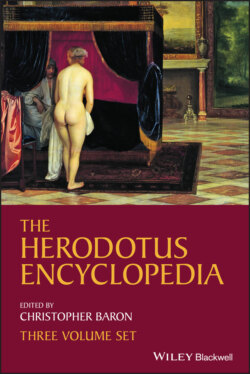Читать книгу The Herodotus Encyclopedia - Группа авторов - Страница 852
ATHLETES AND ATHLETIC GAMES
ОглавлениеZINON PAPAKONSTANTINOU
University of Illinois at Chicago
Herodotus’ Histories contains multiple references to athletes and athletic games, even though sport is not the primary focus of the work. This fact strongly suggests the integral role of athletics in Greek life. Sport is employed and represented by Herodotus in primarily three ways: a) as a hallmark Greek cultural practice that distinguishes and contraposes Greeks and “BARBARIANS”; b) as a means to account for peculiarities of Greek political life, especially regarding inter‐state interaction and diplomacy between poleis on the eve of and during the PERSIAN WARS; c) as a Greek social script that encodes status identities and practices.
Herodotus reports (8.26.1–3) an alleged exchange between Arcadian medizers and the Persians MARDONIUS and TIGRANES, during which the latter expressed their astonishment that Greeks competed in the Olympic games not for MONEY but for excellence (ARETĒ) and an olive crown. Such an idealizing and ennobling depiction of the Olympics is inserted in the context of the victorious (for the Greeks) denouement of the Persian Wars and passes over in silence central factors of Greek athletics, including the fact that symbolic prizes such as crowns were exclusively awarded only in a small number of Greek games. In the earlier books of the Histories the contrast between Greeks and non‐Greeks through sport is manifested primarily in the form of contests of wisdom. In the fictitious dialogue between SOLON and CROESUS (1.29–33), the Lydian king is incredulous at Solon’s assertion that CLEOBIS AND BITON, distinguished for their strong bodies, athletic victories, and reverence for their mother, were considered by the Athenian savant more fortunate than he. In a different episode, an Elean embassy to EGYPT that Herodotus dated to the early sixth century BCE was given the advice that if ELIS wanted to organize a more just Olympic FESTIVAL they should ban their own citizens from competing in the games (2.161). In all these instances non‐Greeks are presented as impervious to the set of values invested in the practice of Greek athletics. This ignorance, Herodotus implies, was directly connected to the lack of large‐scale institutionalized sport among Persians, Egyptians, and other non‐Greek‐speaking groups.
Within Greece Herodotus presents city‐states as employing agonistic festivals to advance partisan strategies and delay military activity at critical points during the Persian Wars. A prominent example is SPARTA’s response in 490 to the urgent Athenian request for assistance in their upcoming military clash with Persian forces. The Spartans agreed to help but not at once, presumably because they were celebrating the CARNEIA (6.106.3; see Kyle 2010, 44). Nearly ten years later, Spartans were once again unwilling to dispatch their full force quickly to fight the Persians because of the Carneia, while other Greeks had similar thoughts because XERXES’ advance coincided with the Olympic festival (7.206.1–2). We know that on other occasions Greeks had no scruples in fighting during the major festivals. In one case they even took the fighting into the sanctuary of ZEUS in OLYMPIA itself while the Olympic games were ongoing (Xen. Hell. 7.4.29–32). Hence the attempts to delay or re‐direct city militias on the grounds of athletic festivals were clearly part of the power struggle between Greek poleis that surfaces also in other parts of Herodotus’ narrative.
Regarding the use of sport in Herodotus to articulate and negotiate identities, the story of the participation of ALEXANDER I of Macedon in the Olympics is instructive on how Herodotus and his AUDIENCE perceived sport (5.22). We are told that other contestants opposed the Macedonian king’s entry on the grounds of his non‐Greek ethnic origin. After Alexander was able to prove his descent from ARGOS, he was allowed to compete in the stadion race. Modern critics are suspicious of the story, but if it really occurred it must date to the early years of Alexander’s reign in the 490s. At any event, Herodotus’ description reflects both an underlying belief that certain athletic festivals, including the Olympics, encapsulated a sense of Greekness at the exclusion of foreigners, as well as a resentment of Greeks towards MACEDONIA and other states that had medized in the Persian Wars. Beyond the concept of Greekness, sport in Herodotus is also portrayed as a signifier of elite culture, especially regarding the sixth century. The stories of the athletic and character trials for the betrothal of AGARISTE (I), daughter of the tyrant CLEISTHENES OF SICYON (6.126–30) as well as the episode concerning the transfer of victory credit from CIMON THE ELDER to the Athenian tyrant PEISISTRATUS for the tethrippon Olympic victory of 532 (6.103) are indicative of a perception, widespread among sixth‐century elites, of sport as an exclusive upper‐class pursuit (Papakonstantinou 2010 and 2013).
SEE ALSO: Competition; Cylon; Ethnography; Games; Medize; Milo; Panhellenism
